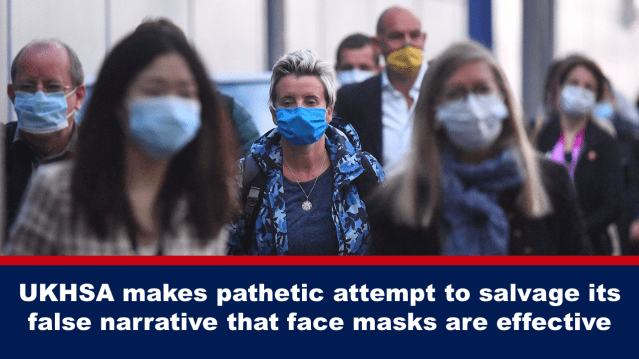UKHSA makes pathetic attempt to salvage its false narrative that face masks are effective
A few days ago, Professors Carl Heneghan and Tom Jefferson published their research into the basis on which we were all forced to wear face masks during the pandemic. Later that day they appeared on GB News to discuss their findings.
UKHSA responded to the GB News interview. If you were hoping UKHSA provided some good solid evidence to support their narrative that face masks are effective you’ll be disappointed. The response was utter nonsense.
“We read and reread [UKHSA’s] message to make sense of it – but we were defeated,” Profs. Heneghan and Jefferson wrote.
Let’s not lose touch…Your Government and Big Tech are actively trying to censor the information reported by The Exposé to serve their own needs. Subscribe now to make sure you receive the latest uncensored news in your inbox…
Before getting to UKHSA’s nonsensical response, below is the interview of the two professors explaining their research on UKHSA’s lack of evidence for mask efficacy. We previously referred to Prof. Heneghan and Jefferson’s research in our article titled ‘Covidian insanity is on full display’ and you can read their review on UKHSA’s “poor” research and “abysmal” quality of evidence on their Substack page ‘Trust the Evidence’ HERE.
Here is UKHSA’s response sent by way of a message to one of the two GB News anchors, Philip Davies MP. Dr Renu Bindra, Deputy Director of Public Health Clinical Response at UKHSA, said:
The current evidence on face coverings suggests that all types of face coverings are, to varying extents, effective in reducing transmission of respiratory viruses in both healthcare and community settings. N95 respirators are likely to be the most effective, followed by surgical masks, and then non-medical masks, although optimised non-medical masks made of 2 or 3 layers might have similar filtration efficiency to surgical masks.
The evidence specific to covid-19 is still limited and does not allow for firm conclusions to be drawn for specific settings and types of face coverings. However, there is no evidence to suggest that face coverings and masks would be less effective at preventing the transmission of covid-19 than any other similar respiratory infection.
“As the source of Dr Bindra’s statement is not cited, we are at a loss to explain the source of such certainty,” the professors noted quoting the Cochrane Review which states: “We are very uncertain on the effects of N95/P2 respirators compared with medical/surgical masks.”
To make matters worse for UKHSA and in direct contradiction to Bindra’s statement, two days before Profs. Heneghan and Jefferson’s GB News interview, The Telegraph reported that health officials admitted that there was no evidence face masks protected the vulnerable from covid:
A rapid review report published by the UK Health Security Agency (UKHSA) investigated if high-quality masks, such as the N95, KN95 and FFP2 coverings, protect clinically vulnerable people in the community from catching Covid.
However, the report was unable to find a single piece of scientific research which had usable data.
Dr Aodhán Breathnach, a Consultant Global Health Microbiologist at UKHSA and a Consultant Medical Microbiologist at St George’s University Hospitals, recently published a study which found masks in hospitals had little impact on Covid transmission in the omicron wave.
“In my view, there is no good evidence that N95 masks work any better than surgical masks.”
No evidence face masks protected vulnerable from Covid, health officials admit, The Telegraph, 12 April 2023
After pointing out the above as well as other contradictions and anomalies in Bindra’s message, the two professors conclude: “The UKHSA statement is an opinion; it is poorly thought through, and it certainly isn’t based on the evidence. It is based on evangelism which is eroding what is left of trust in science.”
Read more in the article ‘Is the UKHSA fit for purpose?’ by Trust the Evidence HERE.
Featured image: UKHSA warns adults to ‘stay home’ or ‘wear face covering’ when going out if feeling unwell, 3 January 2023

This article has been archived for your research. The original version from The Exposé can be found here.



